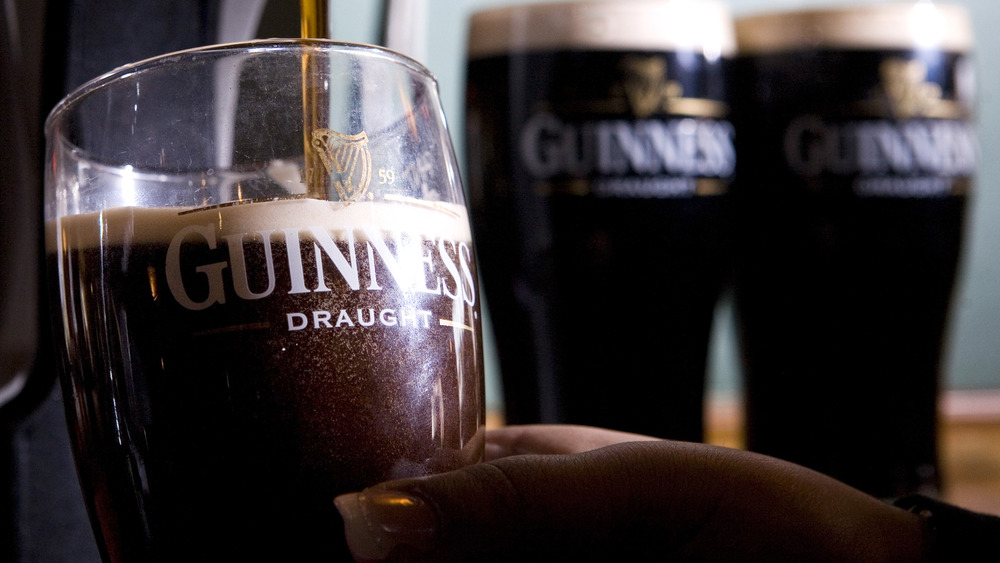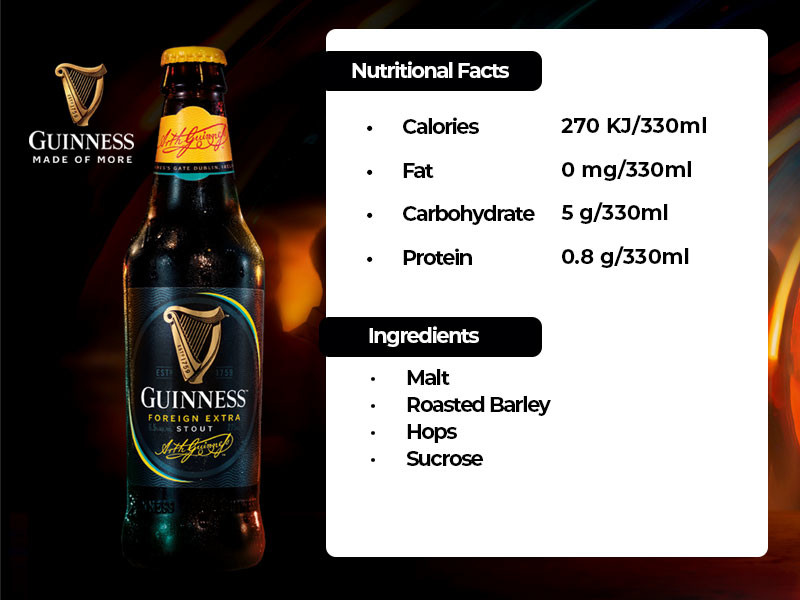The Caloric Composition of a Pint of Guinness
A pint of Guinness contains approximately 153 calories, according to the official nutritional information provided by the brewery. This calorie count is relatively moderate when compared to other alcoholic beverages, such as sweetened mixed drinks or high-alcohol craft beers. However, it is essential to understand that regular consumption of any alcoholic beverage can contribute to weight gain and negatively impact overall health if not balanced with a nutritious diet and regular exercise.
Ingredients and Brewing Process of Guinness
The ingredients and brewing process of Guinness play a significant role in determining the beer’s calorie content. Guinness is made using roasted barley, hops, water, and yeast. The roasted barley gives the beer its distinctive dark color and rich flavor, while the hops contribute to its bitterness. The specific brewing techniques employed by Guinness, such as the unique “surge” and “settle” method, create the beer’s dense, creamy head and contribute to its overall character.
The calorie content of Guinness is primarily influenced by its alcohol by volume (ABV) and carbohydrate content. A pint of Guinness has an ABV of 4.2%, which is relatively low compared to many other beers. However, the roasted barley used in Guinness results in a higher carbohydrate content, contributing to its calorie count. Nevertheless, a pint of Guinness still contains fewer calories than many other popular beer styles and alcoholic beverages.
Guinness in a Balanced Diet: Moderation is Key
Guinness can be part of a balanced diet when consumed in moderation. While it does contain calories, it can be enjoyed as an occasional treat without significantly impacting overall nutritional goals. A single pint of Guinness, with its 153 calories, can be incorporated into a healthy lifestyle by making adjustments to your daily caloric intake and physical activity.
To maintain a balanced diet, consider the following suggestions:
- Monitor your daily caloric intake: Be aware of the number of calories you consume daily and ensure that you’re not exceeding your recommended daily calorie limit. By doing so, you can account for the calories in a pint of Guinness without compromising your weight management or nutritional goals.
- Balance your macronutrients: Ensure that your diet consists of a balance of carbohydrates, proteins, and fats. This balance will help maintain stable blood sugar levels, support muscle growth and repair, and provide the necessary energy for your daily activities.
- Stay physically active: Engage in regular physical activity to burn off any excess calories consumed. Aim for at least 150 minutes of moderate-intensity aerobic activity or 75 minutes of vigorous-intensity aerobic activity per week, as recommended by the World Health Organization.
- Practice mindful drinking: Be present and enjoy your pint of Guinness without distractions. Pay attention to the flavors, aromas, and sensations, and savor each sip. This practice can help you appreciate the experience more and reduce the likelihood of overindulging.
- Pair Guinness with nutritious foods: When consuming Guinness, pair it with nutritious foods such as lean proteins, whole grains, fruits, and vegetables. Doing so can help slow down the absorption of alcohol and provide essential nutrients to support your overall health.
Comparing Guinness to Other Alcoholic Beverages: Calorie Perspective
When considering the calorie content of various alcoholic beverages, it’s essential to understand how Guinness stacks up against other popular choices. This knowledge can help you make informed decisions when selecting drinks that fit your dietary preferences and lifestyle.
| Beverage | Calories (per serving) |
|---|---|
| Pint of Guinness (12 oz / 355 mL) | 153 |
| Glass of Red Wine (5 oz / 148 mL) | 125 |
| Vodka Martini (2.25 oz / 66 mL) | 124 |
| Margarita (4.5 oz / 130 mL) | 168 |
| Pint of Lager (12 oz / 355 mL) | 153 |
| Pint of IPA (12 oz / 355 mL) | 200 |
| Pint of Cider (12 oz / 355 mL) | 196 |
As shown in the table, a pint of Guinness has a similar calorie count to a glass of red wine and a vodka martini. However, it contains fewer calories than a pint of lager, IPA, or cider. When comparing Guinness to other alcoholic beverages, consider the following factors:
- Alcohol content: Guinness has a lower alcohol by volume (ABV) than many other beers, such as IPAs and ciders. This lower ABV contributes to its lower calorie count compared to some higher-alcohol beverages.
- Carbohydrate content: Guinness contains more carbohydrates than many light beers, which can impact its calorie content. However, it has fewer carbohydrates than ciders and some other stouts or dark beers.
- Serving size: Be aware of serving sizes when comparing calorie counts. A pint of Guinness is a standard serving size, while other beverages may have smaller or larger serving sizes, which can affect the calorie comparison.
The Impact of Alcohol on Calorie Burning and Metabolism
Alcohol consumption, including that of a pint of Guinness, can influence calorie burning and metabolism in several ways. Understanding these effects can help you make informed decisions about incorporating Guinness into your diet and lifestyle.
When alcohol is consumed, the body prioritizes metabolizing it over other macronutrients, such as carbohydrates, proteins, and fats. This priority means that other nutrients may be stored as fat instead of being used for energy. As a result, alcohol can indirectly contribute to weight gain and hinder weight loss efforts.
Additionally, alcohol can impact the body’s ability to burn calories efficiently. Research has shown that alcohol consumption can reduce fat oxidation, or the burning of fat for energy, by as much as 30%. This reduction in fat burning can last for several hours after consuming alcohol, further impacting weight management and energy balance.
However, it’s essential to note that moderate alcohol consumption is not necessarily detrimental to overall health and weight management. The key is to consume alcohol in moderation and balance it with a nutritious diet and regular physical activity. By doing so, you can enjoy a pint of Guinness while minimizing potential negative impacts on your metabolism and weight management goals.
Alternatives to a Pint of Guinness: Lower-Calorie Options
While a pint of Guinness can be a delightful treat, it may not always fit into your calorie goals or dietary preferences. Fortunately, there are numerous lower-calorie alternatives available that can still satisfy your cravings for a refreshing alcoholic beverage. Here are some options to consider:
Light Beers
Light beers are brewed with fewer calories and carbohydrates than their full-bodied counterparts. They typically contain around 100-120 calories per 12 oz serving. Popular light beer brands include Michelob Ultra, Bud Light, and Coors Light. These beers offer a crisp, refreshing taste with a lower calorie count compared to a pint of Guinness.
Wine Spritzers
Wine spritzers are a refreshing, low-calorie cocktail made by mixing wine with sparkling water or club soda. A standard wine spritzer contains about 75-100 calories per 5 oz serving, depending on the type of wine used. This option is an excellent alternative for those who prefer the taste of wine but want to reduce their calorie intake.
Non-Alcoholic Beers
Non-alcoholic beers, also known as NA beers, are brewed to resemble traditional beer but with little to no alcohol content. They typically contain around 25-50 calories per 12 oz serving, making them an excellent choice for those looking to significantly reduce their calorie intake. Popular NA beer brands include Heineken 0.0, Budweiser Zero, and Beck’s Non-Alcoholic.
Hard Seltzers
Hard seltzers are a relatively new addition to the alcoholic beverage market. They are made by combining carbonated water, alcohol, and fruit flavors. A standard 12 oz serving of hard seltzer contains around 100 calories, with some brands offering even lower-calorie options. Hard seltzers are a light, bubbly, and fruity alternative to a pint of Guinness.
When selecting lower-calorie alternatives, consider your taste preferences and the occasion. Light beers, wine spritzers, non-alcoholic beers, and hard seltzers all provide unique flavors and experiences, allowing you to enjoy a tasty beverage without compromising your calorie goals or dietary preferences.
Enjoying Guinness Responsibly: Tips and Guidelines
Guinness, like any alcoholic beverage, should be enjoyed responsibly to minimize potential negative health impacts. By following these tips and guidelines, you can ensure that your Guinness consumption aligns with a healthy lifestyle.
Serving Sizes
A standard serving size for Guinness is a pint, which is 16 fluid ounces (473 mL). To maintain a balanced diet and control your calorie intake, stick to the recommended serving size. Avoid consuming oversized portions, which can lead to excessive calorie consumption and hinder your weight management goals.
Frequency of Consumption
Limit the frequency of your Guinness consumption to promote a healthy lifestyle. The Dietary Guidelines for Americans recommend that if alcohol is consumed, it should be done in moderation, defined as up to one drink per day for women and up to two drinks per day for men. By adhering to these guidelines, you can enjoy Guinness while minimizing potential health risks.
Pairing with Nutritious Foods
When consuming Guinness, consider pairing it with nutritious foods to help balance your meal and support your overall health goals. Guinness pairs well with a variety of dishes, including hearty stews, roasted meats, and cheese plates. By incorporating these foods into your meal, you can help slow down the absorption of alcohol and provide essential nutrients to support your body’s functions.
Staying Hydrated
Alcohol is a diuretic, which means it can lead to dehydration. To counteract this effect, drink plenty of water before, during, and after consuming Guinness. Staying hydrated can help reduce the negative impacts of alcohol on your body and support overall health.
Active Lifestyle
Incorporate regular physical activity into your routine to help counteract the calories consumed from Guinness and other alcoholic beverages. Aim for at least 150 minutes of moderate-intensity aerobic activity or 75 minutes of vigorous-intensity aerobic activity per week, as recommended by the World Health Organization. By staying active, you can help maintain a healthy weight and support overall well-being.
In Conclusion: Guinness and Calories
Throughout this article, we have explored the nutritional aspects of a pint of Guinness, focusing on its calorie content. By understanding the caloric composition, ingredients, and brewing process of Guinness, you can make informed decisions about incorporating this popular beer into your diet and lifestyle.
A pint of Guinness contains approximately 153 calories, which is relatively moderate compared to other alcoholic beverages. However, it is essential to remember that alcohol consumption should be done in moderation, as excessive intake can lead to negative health impacts and hinder weight management goals.
When enjoying a pint of Guinness, consider pairing it with nutritious foods, staying hydrated, and practicing responsible drinking habits. By adhering to serving size recommendations and limiting the frequency of consumption, you can enjoy the rich and unique flavor of Guinness while maintaining a balanced diet and promoting overall health.
Additionally, consider exploring lower-calorie alternatives, such as light beers, wine spritzers, or non-alcoholic beers, to mix up your beverage choices and support your health goals. Remember, moderation is key, and understanding the calorie content of a pint of Guinness is just one piece of the puzzle when it comes to maintaining a healthy lifestyle.








